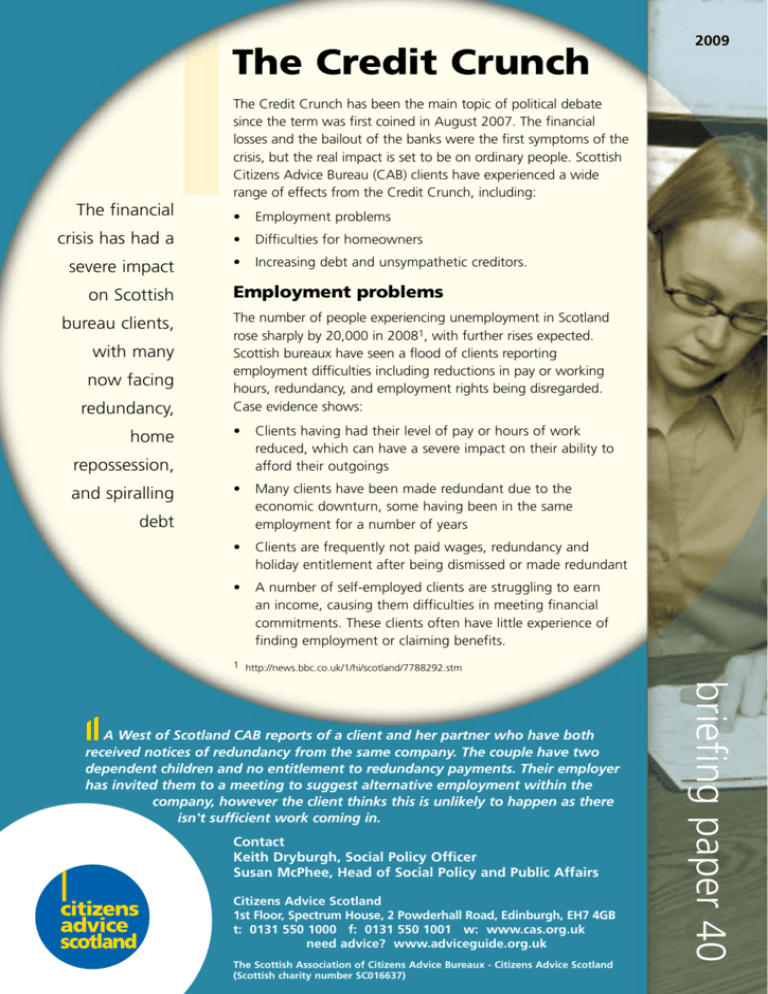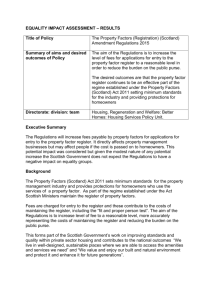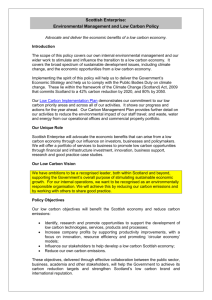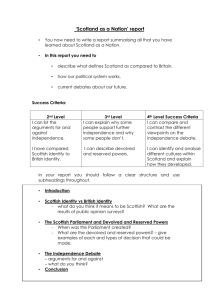Publication - Citizens Advice Scotland
advertisement

The Credit Crunch 2009 The Credit Crunch has been the main topic of political debate since the term was first coined in August 2007. The financial losses and the bailout of the banks were the first symptoms of the crisis, but the real impact is set to be on ordinary people. Scottish Citizens Advice Bureau (CAB) clients have experienced a wide range of effects from the Credit Crunch, including: The financial crisis has had a severe impact on Scottish bureau clients, with many now facing redundancy, home repossession, and spiralling debt • Employment problems • Difficulties for homeowners • Increasing debt and unsympathetic creditors. Employment problems The number of people experiencing unemployment in Scotland rose sharply by 20,000 in 20081, with further rises expected. Scottish bureaux have seen a flood of clients reporting employment difficulties including reductions in pay or working hours, redundancy, and employment rights being disregarded. Case evidence shows: • Clients having had their level of pay or hours of work reduced, which can have a severe impact on their ability to afford their outgoings • Many clients have been made redundant due to the economic downturn, some having been in the same employment for a number of years • Clients are frequently not paid wages, redundancy and holiday entitlement after being dismissed or made redundant • A number of self-employed clients are struggling to earn an income, causing them difficulties in meeting financial commitments. These clients often have little experience of finding employment or claiming benefits. 1 http://news.bbc.co.uk/1/hi/scotland/7788292.stm Contact Keith Dryburgh, Social Policy Officer Susan McPhee, Head of Social Policy and Public Affairs Citizens Advice Scotland 1st Floor, Spectrum House, 2 Powderhall Road, Edinburgh, EH7 4GB t: 0131 550 1000 f: 0131 550 1001 w: www.cas.org.uk need advice? www.adviceguide.org.uk The Scottish Association of Citizens Advice Bureaux - Citizens Advice Scotland (Scottish charity number SC016637) briefing paper 40 A West of Scotland CAB reports of a client and her partner who have both received notices of redundancy from the same company. The couple have two dependent children and no entitlement to redundancy payments. Their employer has invited them to a meeting to suggest alternative employment within the company, however the client thinks this is unlikely to happen as there isn't sufficient work coming in. Difficulties for homeowners Homeowners in Scotland are facing numerous problems in the housing market – house prices are falling, fixed-term mortgages are ending, and there are fewer mortgage deals available. Add to this the increasing number of redundancies and the effect is that homeowners are struggling to meet their mortgage obligations and are at an increased risk of losing their home. Anecdotally, bureaux report a marked increase in the number of homeowners that are approaching them for advice. Case evidence shows: • Clients whose mortgage commitments were made when in well paid jobs are now falling behind in their payments due to cuts in hours, pay or even redundancy • Creditors are instigating legal action quickly when clients experience financial problems, including starting repossession action when a client was only two months behind in repayments • Private renters have been evicted from their tenancy after their landlord’s property was repossessed. Increasing debt and unsympathetic creditors As incomes fall and repossessions rise, the UK’s already serious personal debt problems are getting worse. Bureaux across Scotland are reporting significant increases in the number of clients seeking advice for their money troubles, with individual bureaux reporting an increase in debt cases of up to 70% on the previous year. Case evidence shows: • Clients who are made redundant can quickly fall behind on their credit repayments and are approaching bureaux for debt advice • Self-employed clients whose work has dried up are seeking advice about existing credit agreements • Creditors are becoming more aggressive in collecting debts, including making numerous phone calls to clients, and quickly passing on debts to debt collection companies • The number of bankruptcies increased markedly in 2008, mainly due to the Low Income Low Assets (LILA) scheme starting in April, but the £100 fee for accessing the scheme is proving prohibitive to many clients who would benefit from it. CAS proposals for change The credit crunch has had a wide ranging impact on Scottish society. Both the Scottish and UK Governments need to ensure that the effects of this impact on vulnerable citizens are minimised, and that remedies are in place to ensure greater protection for workers and homeowners. In particular: • Recognition that frontline advice is critical, and that further resources will be made available to assist people to cope with this unprecedented crisis • CAS welcomes the Scottish Government's announcement of a new Debt Action Forum, and calls for the group to work to plug the gaps that exist between the current debt assistance schemes, which are excluding many vulnerable people from getting help • The Scottish and UK Governments should ensure that its housing remedies are accessible to a wide range of homeowners so that as many people as possible are helped to avoid repossession. Case evidence A West of Scotland CAB reports of a client who was informed by text message that the company was bankrupt and there was no money to pay wages. The client accepted the explanation given the media coverage of the credit crisis, but later found out that the company has continued trading with fewer employees. The client is still owed one month’s wages, two week’s holiday pay, and redundancy payments. The client has received no written or spoken confirmation from the company confirming their position. A North of Scotland CAB reports of a client who obtained a mortgage when he was in well paid employment, but who is now struggling with financial commitments after losing his job. Although he is back in employment, he has fallen into financial difficulties due to a reduction in salary. His mortgage lender has informed the client that as soon as he falls three months behind they will initiate proceedings to repossess his home.







